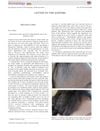22 citations,
June 1998 in “PubMed” Panax ginseng helps prevent hair follicle cell death and speeds up hair cell recovery after radiation in mice.
 30 citations,
December 2017 in “Medical Hypotheses”
30 citations,
December 2017 in “Medical Hypotheses” The model suggests that scalp tension could lead to hair loss, with factors like blood vessel hardening, enlarged oil glands, and poor microcirculation also playing a role. It also hints at a possible link between skull shape and baldness pattern.
 5 citations,
February 2015 in “Endocrinology Diabetes and Metabolism Case Reports”
5 citations,
February 2015 in “Endocrinology Diabetes and Metabolism Case Reports” Insulin therapy helped a man with autoimmune issues regrow his hair.
 9 citations,
September 2012 in “Clinical Endocrinology”
9 citations,
September 2012 in “Clinical Endocrinology” More than half of patients who had acromegaly surgery experienced hair loss, with varying degrees of recovery.
 60 citations,
October 2005 in “Experimental Dermatology”
60 citations,
October 2005 in “Experimental Dermatology” Zinc can both inhibit and stimulate mouse hair growth, and might help recover hair after chemotherapy.
 39 citations,
December 2001 in “JNCI: Journal of the National Cancer Institute”
39 citations,
December 2001 in “JNCI: Journal of the National Cancer Institute” Using a gene therapy with the Sonic Hedgehog gene helps mice regrow hair faster after losing it from chemotherapy.
1 citations,
November 2022 in “International journal of molecular sciences” Human fetal placental stromal cell injections speed up healing and improve skin and hair recovery after radiation damage.
 51 citations,
November 2020 in “Journal of the European Academy of Dermatology and Venereology”
51 citations,
November 2020 in “Journal of the European Academy of Dermatology and Venereology” COVID-19 infection may cause significant hair loss, but full hair recovery is likely without special treatment.
 January 2023 in “International journal of sciences”
January 2023 in “International journal of sciences” Platelet-Rich Plasma therapy helped significantly in hair recovery for a hair loss condition after infection.
 3 citations,
June 2018 in “Australasian journal of dermatology”
3 citations,
June 2018 in “Australasian journal of dermatology” Eight people with severe hair loss grew their hair back naturally.
 1 citations,
December 2022 in “PubMed”
1 citations,
December 2022 in “PubMed” COVID-19 may cause temporary hair loss, which usually gets better on its own, but reducing stress and managing health issues might help recovery.
 54 citations,
January 2013 in “BMC Complementary and Alternative Medicine”
54 citations,
January 2013 in “BMC Complementary and Alternative Medicine” Thuja orientalis hot water extract may help hair grow by starting the growth phase and improving hair follicle development.
 1 citations,
July 2023 in “Biomimetics”
1 citations,
July 2023 in “Biomimetics” A new hair treatment using a natural polyphenol complex improves hair strength, reduces static, and protects against UV damage.
 August 2023 in “International journal of research in medical sciences”
August 2023 in “International journal of research in medical sciences” The serum is safe and helps treat premature greying of hair.
 27 citations,
December 2020 in “Experimental Dermatology”
27 citations,
December 2020 in “Experimental Dermatology” Grey hair and baldness may be linked to COVID-19 severity, but more analysis is needed; post-infectious hair loss is related to the severity of the disease and usually recovers within 3-6 months.

The patient with total hair loss did not regrow hair despite treatment, indicating a poor outlook for this type of hair loss.
12 citations,
January 2021 in “Journal of Cutaneous and Aesthetic Surgery” Epidermal growth factor helps skin and hair regeneration but needs more research for better understanding.
 64 citations,
November 2008 in “Journal of The American Academy of Dermatology”
64 citations,
November 2008 in “Journal of The American Academy of Dermatology” A new type of rapid hair loss called ADTA usually gets better on its own within 6 months.
 9 citations,
November 2012 in “Hepatology Research”
9 citations,
November 2012 in “Hepatology Research” A man lost all his hair permanently after hepatitis C treatment, a side effect not seen before.
 8 citations,
February 2022 in “Scientific Reports”
8 citations,
February 2022 in “Scientific Reports” Medicinal herbs might treat hair loss by affecting genes and pathways related to lipid and glycerophospholipid metabolism.
 2 citations,
July 2023 in “Life”
2 citations,
July 2023 in “Life” COVID-19 can cause temporary hair loss, which is commonly reversible with treatment.
 February 2018 in “Medicine - Programa De Formación Médica Continuada Acreditado”
February 2018 in “Medicine - Programa De Formación Médica Continuada Acreditado” Minoxidil and finasteride are the main FDA-approved treatments for hair loss, with other methods showing promise but lacking strong evidence.
 2 citations,
March 2015 in “Hepatitis Monthly”
2 citations,
March 2015 in “Hepatitis Monthly” A woman's hair loss during Hepatitis C treatment with PEG-INF-a-2a and Ribavirin was reversible after stopping the medication.
 May 2015 in “Cancer Research”
May 2015 in “Cancer Research” A new treatment may prevent hair loss from chemotherapy by normalizing scalp cell death and reducing inflammation.
 2 citations,
May 2023 in “Clinical case reports”
2 citations,
May 2023 in “Clinical case reports” PRP therapy can effectively treat hair loss after COVID-19 vaccination.
 2 citations,
September 2021 in “JAAD case reports”
2 citations,
September 2021 in “JAAD case reports” Dupilumab helped a woman with severe hair loss regrow her hair quickly and maintain it for six months after stopping treatment.
 July 2016 in “Cancer Research”
July 2016 in “Cancer Research” A topical lotion helped manage hair loss from chemotherapy by affecting cell death, inflammation, and collagen, with no side effects.
 November 2023 in “The journal of investigative dermatology/Journal of investigative dermatology”
November 2023 in “The journal of investigative dermatology/Journal of investigative dermatology” The study developed a mouse model for Alopecia Areata that responds to treatment, useful for future research.
The 2% minoxidil cream is stable, spreads well on the skin, and helps with hair growth.
 December 2014 in “Endocrinología y nutrición”
December 2014 in “Endocrinología y nutrición” The woman's rare combination of diseases suggests an unknown factor may predispose individuals to multiple endocrine diseases.

























